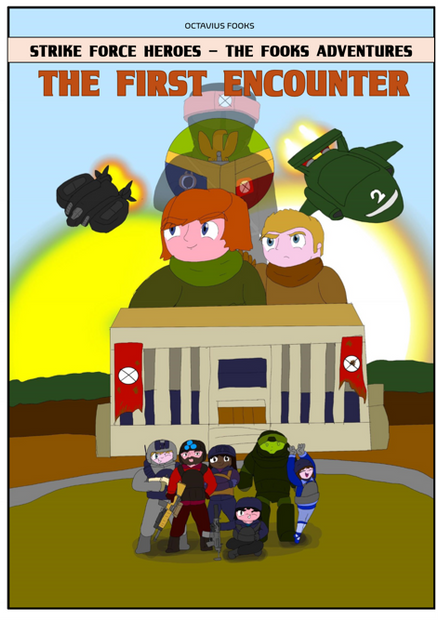HOME | DD
 QuantumBranching — Caliphate of Rum
QuantumBranching — Caliphate of Rum

Published: 2011-01-10 07:02:38 +0000 UTC; Views: 13449; Favourites: 72; Downloads: 186
Redirect to original
Description
Ok, another Bruce/Tormsen co-production, with a bit stolen from GURPS Alternate Earths...In this world in the decades immediately before the Islamic explosion, the Persian-Byzantine wars and the Byzantine struggles in Europe went a bit differently, so that Persia was close to it's "fighting peak" while Byzantium was in the midst of internal disturbances when the Arab armies emerged from the peninsula. The Persians lost Mesopotamia, but managed to rally on the Iranian plateau, while the New Rome fell to combined land-sea assualt in the 600s.
The Arabs, dazzled by their conquest of what was still the Empire, ended up putting their capital in Constantinople rather than Damascus and Baghdad: in this world, the Islamic regime is seen as a continuation of the Roman empire under new management rather than a totally new venture. Arabic failed to replace Greek as the language of the court, and while it became the sacred language of religious scholars and triumphed as a popular language over similar languages in Syria and Mesopotamia, failed to displace Coptic and Greek from the vernacular in their heartlands.
Seeing themselves as being given the Roman Empire by God to convert to the true faith, the new Empire of Rum's greatest efforts were westwards to Italy, North Africa, and beyond. Steppe invaders of the Balkans were pacified and converted, and at its height the empire ruled from The City included almost all the old Roman empire had held save northern Gaul and the British isles.
Christianity, facing a two-pronged Islamic invasion fiercer than OTL, steppe invasions from the east, and the pagan vikings from the north, was in trouble, which was seriously compounded when a synectic heresy arose in the north, combining elements of Christian faith and Viking religion in a potent "warrior" religion that combined un-Lambish ass-kicking with a promise of salvation. There was a brief 10th century rallying centered in South Germany, but a wildly premature effort to reconquer Italy and a fresh series of invasions from the east crippled the Empire of Christ, and the next millenium would see a slow and painful dwindling of Christianity in Europe.
Persia, facing cultural annihilation and further Islamic invasions, saw the rebirth of Zoroastrianism as a popular, rather than elite religion, a trend stregnthened by the brief Islamic conquest of most of the remaining empire a couple centuries later, and it's Reconquista from what OTL would be Afghanistan (aided, admittedly, by some Rum-punishing Turkish invasions). Nestorian Christianity, which had once seemed to be a front-runner to replace the Zoroastrian faith, became increasingly persecuted, and its adherents moved north and east, into Siberia, north central Asia, and the lands of the Chinese. Persia fought Rum for control of Mesopotamia, and expanded east into the Hindu and Buddhist lands of India.
History happened.
In the year 1889, the Empire of Rum, although still cultured, artistic, makes great candy, etc. is corrupt, weak and generally on its last legs: it last showed a burst of energy a century ago, when it reconquered Egypt. Nowadays, its inhabitants await either conquest by Persia or "liberation" (hah!) by either the Italian or Algerian Caliphs, who espouse reform and religious purification (translation: killing a lot of no-account people), with a certain philosophical stoicism.
The agressive new regimes currently fighting for control of the Mediterranean are really messing up trade, which annoys the more easy-going, commercial-minded and more democratic regimes of western Islam, coastal west Africa, Iberia, and their current and former colonies. Although they not rarely fight among themselves over territory and trade, there is an increasing sense of community and fellow interest between these Islamic states where powerful religious associations, great merchant families, rich plantation owners and independent-minded cities challenge the power of Emirs, women are educated, and laws are at times stronger than princes.
Scholars and community leaders increasingly speak of an "Atlantic community" seperate from the old Islamic heartlands, and perhaps with a destiny of its own. (The bellicose Tlaxcalans, whose elites speak Arabic-Berber but still love blood and flowers, are a bit of an exception among western Muslims). They trade a great deal with the Chinese and the Hindus and Buddhists of India, which although dammned heathens are rich, advanced, and tolerant (some Iberian philosophers have gone so far as to suggest that an educated, tolerant Pagan may be a better thing in Allah's eye than an ignorant, bloodthirsty Muslim like a Somali or a Magyar)
To the north of the Islamic lands, are the Thorist-Christians, their millenial enemies. Southern France and Eastern Europe are often referred to in Constantinople as the "fields of blood" thanks to the centuries of back-and-forth warfare. Currently things are somewhat quiet, the Islamic world being mostly concerned with internal issues and quarrels and the Thorist-Christians are happy enough to let them be and work to build up their defenses: they have slipped behind somewhat in military technology in the last couple centuries.
The TC lands are fairly firmly stuck in the later middle ages: although fairly tolerent (men of all faiths will have an opportunity to chose the Right Side when Ragarnok comes), society is conservative and hierarchical, and there is no real scientific world-view: a practical-minded bunch, the northmen are uninterested in wooly philosophizing, do not write dictionaries, and know and care little about the "classical tradition", fairly well known in the Islamic lands.
North America was colonized in a slow and piercemeal fashion by Danes, Germans, Scots, Irish, etc. for a couple centuries before the Muslims cottoned onto how big a thing the northern savages had discovered. Wars between different Muslim nations and Thorist-Christians slowed colonization further, so germs, steel and horses managed to spread enough to give some native Americans a bit of a breather. Still, the last major native state to neither convert or be conquered, the Inca, now almost as post-the-sell-date as Rum, are presently being invaded by the African-derived Empire of the Green, which is miffed over the mistreatment of missionaries by the priests of the sun-God.
Persia has had its ups and down over the last millenium, including a period of Turkish rule, but is currently on a bit of an upswing: although China currently is in the ascendant in east central Asia, possibilities beckon in the west. Relatively intolerant (although some Muslim nations are worse) Persia is today pretty solidly Zoroastarian, with only small Jewish, Muslim, and Hindu minorities, and hardly any Christians. Intermittent but frequent contact overland with China has had some effect, including the development of an extensive test-prone professional beaurocracy and a highly literate society (given the relative ease of learning a phonetic rather than an ideographic script, more so than the Chinese themselves).
China in turn has picked up some ideas on military practices and royal symbolism from the Persians. The Chinese religious mosaic is even more complex than OTL, given Zoroastrian and Nestorian Christian minorities, which are occasionally persecuted as possible agents of the Shahs or the Khans. There is some concern re the stability of the Mandate of Heaven: as OTL American food plants have helped swell the numbers of Chinese, and in spite of some expansion to the SW, land is in short supply. Immigration to SE Asia is now being promoted as a means of relieving population pressures, which is not being contemplated very agreeably by the locals.
India has been exposed to Muslim, Zoroastrian and Chinese cultural influences, and large parts of North India have at times been _part_ of the Persian empire. Indian culture and civilization has developed on somewhat different paths, and Buddhism has remained a mass faith (although with Indian syncretic tendencies, it's usually Hindu-ish Buddhism and Buddha-ish Hinduism). After the Buddhist Shadow of the Infinite (AKA king) of Bengal led an alliance to kick the Persians west of the Indus a couple centuries ago, a loose alliance-coalition of Indian states, Hindu and Buddhist, has formed under the Shadow's nominal rule, to keep the Holy Peace and keep the King of Kings (and of late, the Emperor of all-under-heaven) at bay.
The Turks have played a minor role in Islamic history (with various knock-on effects: more use of peasant levies and less of slave soldiers, for instance), but a major one in Persian history, and the Turks in the end divided between western Zoroastrians and eastern Nestorians: the Nestorian Khanate had its golden age, in which it overran central Asia, much of North China, and southern Gardarika, but as superior gunpowder weapons and methods of military organization have spread, the Khanate has been on the defensive for a while. Currently they are under pressure from the Gardarikans, who are a scary bunch even by Thorist standards: they'll no longer pull your lungs out through your back and nail you to a tree while you're still alive for religious reasons, but by Odin-Jehovah they'll do it for good solid _legal_ reasons, such as being a rebel.
In increasing numbers Turks, Mongols, etc. of the Nestorian persuasion move to the new continent, which they initially reached like OTL's Russians by following the trail of profitable furs ever north and east. Perhaps one day the Empire will have to move lock, stock and barrel to the new world: the current Khan is made hopeful by the new discoveries of gold, since gold will buy a lot of Japanese military expertise (the Chinese emperor forbids his subjects and vassals from taking part in such trade, but the Japanese don't care what he thinks. Dwarf monkeys indeed).
The world is somewhat backwards compared to OTL: Persian and Chinese tech is along the lines of OTL mid-1800s China, although with considerably superior gunpowder armies (with the Persians at their backs, the Chinese did not let their capacities decay the way the Manchus did after the 1600s) and both use (sail-powered) ironclads to protect their coasts and sink pirates. There's something like a genuine scientific tradition in the Islamic lands, and there's a shitload of philosophers working on mathematics, chemistry, fluids, etc. in the Mediterranean and the Atlantic Community nations, which have also developed some impressive rule-of-thumb engineering increasingly supplemented with actual written manuals, dictionaries, etc.
There is a comparable level of intellectual development in India, cross-fertilized by the now sizeable community of Muslim merchants and converts in India. Both the Muslims of the Atlantic Community and the Indians are increasingly interested in "manufactures" - cloth, metal goods, weapons, medicines, etc. - as well as precious metals and agricultural output as sources of wealth, and once either the Sri Lankans or the south Africans expand the use of steam beyond its current uses in automated temple music and draining mines, an industrial revolution is quite likely.
Related content
Comments: 5

👍: 0 ⏩: 0

Your welcome.^^
So on another note, what is your opinion on MLP Season 7 so far?
👍: 0 ⏩: 0

Thorism sounds like the most badass Christian sect ever imagined.
👍: 0 ⏩: 0

























